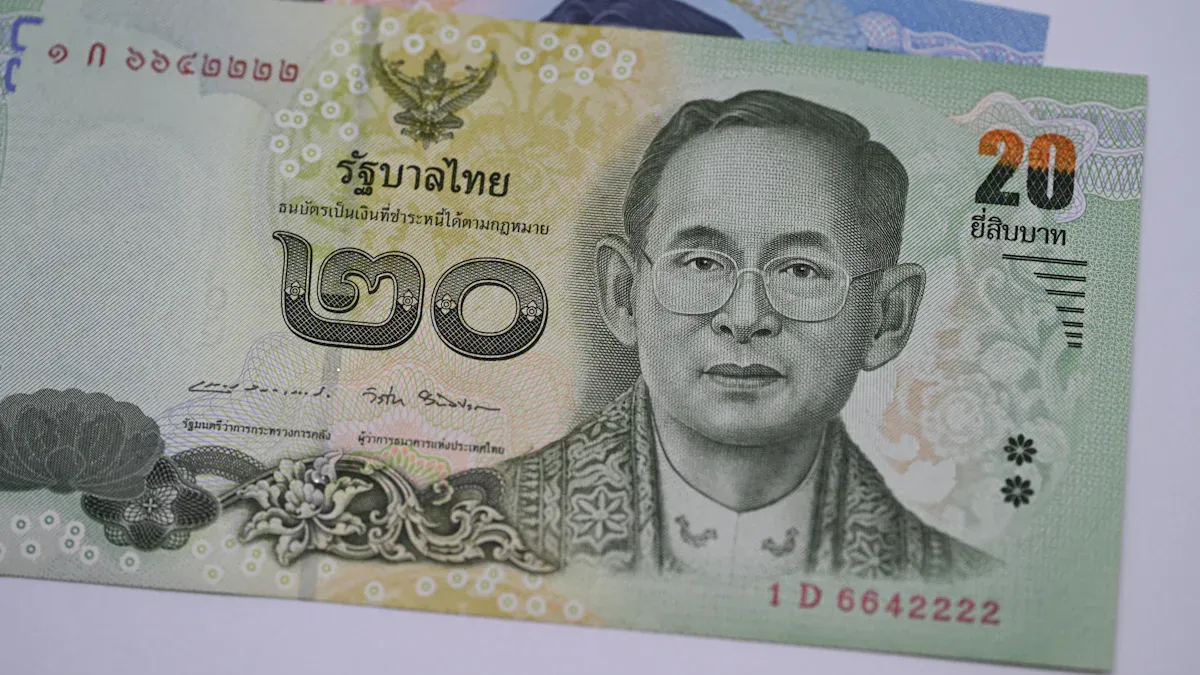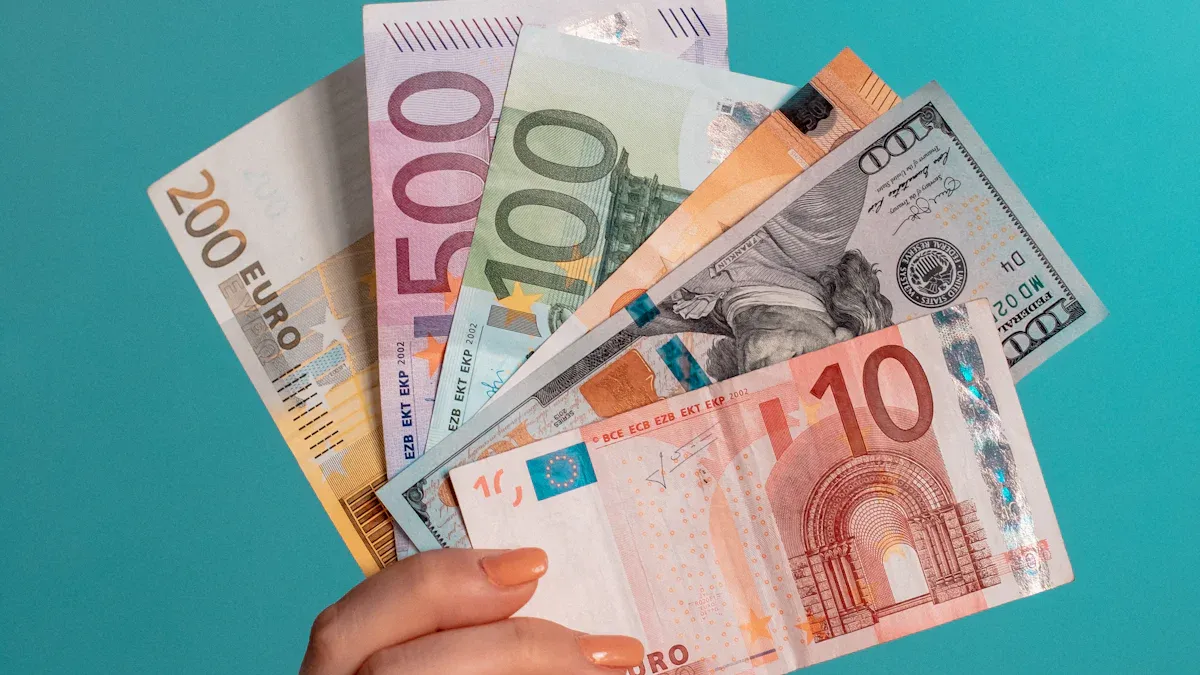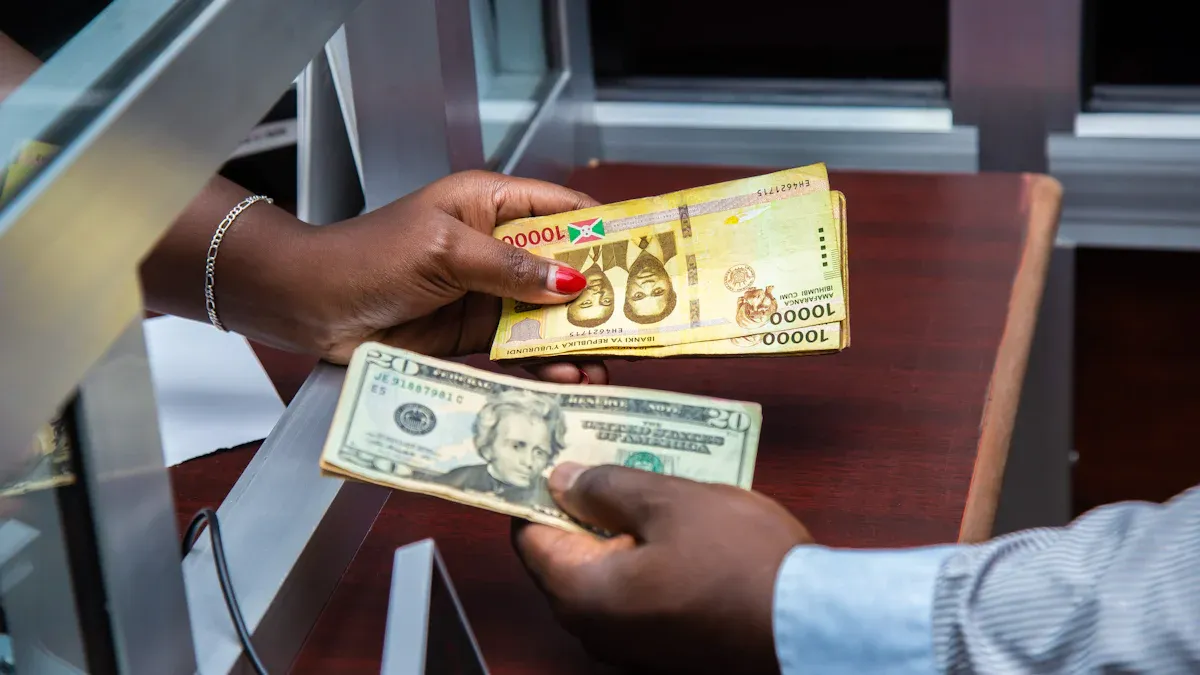- EasyCard
- Trade
- Help
- Announcement
- Academy
- SWIFT Code
- Iban Number
- Referral
- Customer Service
- Blog
- Creator
Five Financial Matters You Must Know Before Traveling to Thailand: A Guide to Remittances and Currency Exchange

Image Source: pexels
When planning your trip to Thailand, are you concerned about how to handle remittance and currency exchange safely and cost-effectively? Before you depart, you need to understand the essential financial details for traveling to Thailand to avoid common pitfalls. Many tourists make the following mistakes:
- confusing Thai Baht notes, especially the 50 and 500, or 100 and 1000 denominations.
- Falling for scams with tuk-tuks or taxis by not negotiating prices in advance.
- Overlooking tax refunds, failing to apply for them after meeting the minimum spending requirement.
Being prepared in advance can protect your funds and reduce unnecessary losses.
Key Takeaways
- Understand Thai Baht denominations and exchange rates to avoid confusion and losses.
- Choose professional exchange offices in the city for better exchange rates and lower fees.
- When withdrawing from ATMs, be aware of international withdrawal fees and opt for local currency billing.
- When using credit cards, avoid dynamic currency conversion and choose to settle in Thai Baht.
- Stay vigilant and select reputable exchange services to protect your personal information and funds.
Essential Information on Currency and Exchange Options for Thailand Travel

Image Source: unsplash
Introduction to Thai Baht
When traveling in Thailand, the official currency you’ll use is the Thai Baht (THB). The Thai Baht has a large circulation in Thailand, with a total volume of approximately ฿1.455 trillion. Its daily trading volume in the global forex market is about $1.6 billion. When exchanging Thai Baht, common banknotes are in denominations of 20, 50, 100, 500, and 1000. Before your trip, it’s important to understand the exchange rate fluctuations between Thai Baht and major currencies.
Recently, the Thai Baht to Chinese Yuan rate dropped from 0.224 to 0.223, the USD to Thai Baht rate is 31.885, and the 30-day average Euro to Thai Baht rate is 37.6188. You can refer to the table below for a quick overview of the latest exchange rates for major currencies against the Thai Baht:
| Currency Pair | Current Rate | Previous Day Rate | Change |
|---|---|---|---|
| Thai Baht to Chinese Yuan | 0.223 | 0.224 | Decrease |
| USD to Thai Baht | 31.885 | N/A | Stable |
| Euro to Thai Baht | 37.6188 | N/A | Decrease |
Overview of Exchange Options
There are five main currency exchange options you need to know before traveling to Thailand: cash exchange, ATM withdrawals, credit and debit cards, traveler’s checks, and digital wallets. Each method has its pros and cons. Cash exchange often offers better rates, but you need to ensure you bring clean, undamaged USD notes. ATM withdrawals are convenient in cities and tourist areas with decent rates, but you should be mindful of international withdrawal fees and Thai ATM charges. Major merchants, hotels, and restaurants generally accept credit and debit cards, but small shops and street vendors only take cash, and when using cards, opt for local currency billing. Traveler’s checks are less convenient to exchange in Thailand and incur a fixed fee per check. Digital wallets are increasingly common for small payments in Thailand but are typically limited to users with Thai bank accounts. When choosing an exchange point, pay attention to fees and rates. Banks and professional exchange offices generally offer safer and more official rates but have limited operating hours.
Professional exchange offices like SuperRich Thailand are widely available in major cities and offer competitive rates. Airports and hotels are convenient but typically have lower exchange rates and higher service fees. Knowing these details before traveling to Thailand can help you plan your finances wisely and avoid unnecessary losses.
Pros and Cons of Exchange Locations
Airport Exchange Points
When you arrive at a Thai airport, exchange counters are very convenient. You can immediately obtain Thai Baht for taxi fares or small purchases. Airport exchange points have long operating hours, suitable for travelers with unpredictable flight schedules.
Airport exchange points typically offer lower exchange rates, with higher fees. When exchanging USD cash, you’ll receive fewer Thai Baht compared to city exchanges. Airport exchange points are suitable for emergencies but not recommended for large exchanges.
Pros and Cons of Airport Exchange Points:
| Pros | Cons |
|---|---|
| Convenient and fast | Lower exchange rates |
| Available anytime | Higher fees |
| Suitable for emergencies | Limited exchange amounts |
City Banks and Exchange Offices
In the city, you can choose banks or professional exchange offices for currency exchange. Hong Kong-licensed banks have branches in Thailand, offering safe and reliable exchange services. Professional exchange offices like SuperRich Thailand are widely distributed and have flexible operating hours.
City exchange offices generally offer better rates and lower fees. When exchanging USD cash, you’ll get more Thai Baht. Banks and exchange offices are highly secure, suitable for large exchanges.
Before traveling to Thailand, know that professional exchange offices typically offer more cost-effective rates than airports and hotels.
Other Channels
You can also exchange money at hotel front desks, small shops, or through ATM withdrawals. Hotel exchanges are convenient but offer the lowest rates and highest fees. Small shops pose higher risks, including counterfeit currency or scams. ATM withdrawals are suitable for those with international bank cards, offering decent rates, but each withdrawal incurs a USD service fee.
When choosing other channels, prioritize safety and financial management. It’s recommended to exchange only at reputable locations to avoid unnecessary losses.
Fees and Exchange Rates
Real-Time Exchange Rate Checks
Before traveling to Thailand, it’s crucial to stay updated on exchange rate information. Rates fluctuate daily, and choosing the right time to exchange can save you significant costs. You can access the latest Thai Baht exchange rates through the following channels:
| Source | Description |
|---|---|
| XTransfer | Provides real-time Thai Baht to USD rates, supporting 24/7 online exchanges. |
| Wise | Compares real-time rates from multiple currency transfer services to help you get the best value. |
| Bank of Thailand | Provides daily forex rate data from commercial banks in Bangkok. |
You can check the latest rates before departure or upon arrival in Thailand to plan your exchanges wisely.
Avoiding Hidden Fees
When exchanging currency, beyond focusing on rates, be cautious of various hidden fees. Common fees include:
- Exchange rate spreads: Some providers offer low fees but inflate rates to increase your actual costs.
- Intermediary bank fees: For bank transfers, intermediary banks may deduct fees from the transferred amount, reducing what the recipient receives.
When choosing an exchange channel, ask for a detailed breakdown of all fees to avoid overpaying due to hidden costs.
Money-Saving Tips
You can effectively reduce exchange costs with the following methods:
- Avoid dynamic currency conversion (DCC) and choose to pay in Thai Baht when using credit cards to avoid extra conversion fees.
- Use digital wallets (e.g., Wise, Revolut) for low-cost currency transfers, ideal for frequent small exchanges.
- Choose professional currency exchange providers like SuperRich, which typically offer competitive rates and transparent fee structures.
- Frequent small exchanges can reduce risks from rate fluctuations.
- If staying in Thailand long-term, consider finding bank accounts with no fees to further save costs.
When exchanging money at airports, you’ll often encounter the least favorable rates. It’s recommended to exchange at professional exchange offices in the city, especially well-known brands, for better safety and rates.
Safe Money Exchange Tips

Image Source: pexels
Scam Prevention
Before traveling to Thailand, be aware that you need to take extra precautions against scams when exchanging money. Common scams include false exchange rates, issuing old or damaged notes, and distraction tactics. Some exchange points display rates inconsistent with the market, leading you to receive far less money than expected.
Some merchants may give you old or damaged notes, which may not be accepted at other exchange points or banks.
Others may use calculators or other tactics to distract you, making you believe you received more money than you did.
You can protect yourself with the following measures:
- Choose reputable currency exchange services.
- Carefully verify the exchange rate to ensure it aligns with market rates.
- Count all cash carefully before leaving the exchange point.
Tip: Exchanging money at professional exchange offices in the city typically offers more transparent rates and safer services.
Information Protection
When exchanging money or using bank cards, protect your personal information. Do not share your passport number, bank card details, or other sensitive information with strangers. When filling out forms at banks or exchange offices, ensure information is only given to staff.
When using ATMs, shield the keypad to prevent password theft.
Avoid connecting to unsecured Wi-Fi in public places for online banking operations.
When using services from Hong Kong-licensed banks, familiarize yourself with the relevant procedures in advance to avoid losses due to information leaks.
Cash Management
During your trip in Thailand, managing cash wisely is crucial. Plan your daily expenses and carry a moderate amount of small-denomination cash for convenience at small vendors or taxis.
- Keep large USD notes for use at hotels or large malls.
- Use anti-theft bags or concealed money belts to store cash and bank cards securely.
- Avoid displaying large amounts of cash in busy tourist areas.
- When withdrawing from ATMs, consider withdrawing larger amounts at once to reduce transaction fees.
When carrying large amounts of cash, be extra cautious and consider using inner pockets or concealed money belts. Choosing reputable exchange points can also help you save on expenses during your trip.
Remittance Process and Considerations
Remittance Options
Before traveling to Thailand, know that choosing the right remittance method can make your fund transfers safer and more efficient. Common remittance methods include:
- Cash
- Bank transfers
- Credit and debit cards
- Digital payments (e.g., PromptPay and TransFi)
- Digital wallets (e.g., TrueMoney Wallet and Rabbit LINE Pay)
You can choose the most suitable method based on your needs and convenience. If you use remittance services from Hong Kong-licensed banks, they are generally secure and ideal for large transfers. Digital payments and wallets are better for small, instant transfers.
Process and Required Documents
When handling international remittances, you need to prepare required documents in advance. Requirements vary by channel but typically include:
| Document Type | Description |
|---|---|
| Statement of transfer purpose | Explanation of the reason for the transfer |
| Proof of fund source | Evidence of the origin of the funds |
| Recipient identification | Verification of the recipient’s identity |
| Commercial documents (if applicable) | Relevant documents for commercial purposes |
Before initiating a remittance, consult your bank or service platform to ensure all documents are complete to avoid delays due to missing information.
Fees and Processing Time
When choosing a remittance service, pay attention to fees and processing times. Different providers have varying fees and speeds. The table below outlines the fees and processing times for major channels:
| Service Provider | Fee Range | Processing Time |
|---|---|---|
| Traditional Banks | 0.5% - 5% | 3 - 5 business days |
| Western Union | N/A | Near-instant or 1-2 business days |
| MoneyGram | N/A | Near-instant or 1-2 business days |
| Digital Wallets and Online Platforms | N/A | Near-instant |
If you choose traditional bank transfers, they typically take 1 to 5 business days with fees ranging from 0.5% to 5%. For example, transferring from the US to Thailand costs about USD 35.00. Third-party platforms like Western Union, MoneyGram, and digital wallets offer faster processing, ideal for urgent needs. Before remitting, compare the fees and processing times of different providers to plan your funds wisely and avoid delays affecting your itinerary.
Before traveling to Thailand, know that proper financial preparation and exchange choices directly impact your travel experience. You can exchange USD cash at reputable exchange offices or Hong Kong-licensed banks to avoid unfavorable rates and hidden fees at airports and tourist areas. Using small-denomination Thai Baht is more convenient for daily payments, and protecting your belongings is equally important. Staying updated on the latest policies, such as QR code payments and changes to foreign currency transfer limits, can improve remittance efficiency. You can use digital platforms to access real-time exchange rates, compare fees from different providers, and adapt to market changes flexibly. Based on your needs, combine Thailand’s exchange rates and living costs with those of other Southeast Asian countries to plan your funds wisely, minimize losses, and enjoy a safe, cost-effective trip.
FAQ
Can you use mainland Chinese bank cards in Thailand?
You can use mainland Chinese bank cards at most ATMs and malls in Thailand. Be aware that each withdrawal incurs a USD service fee, so check with your issuing bank in advance.
How do you check the real-time Thai Baht to USD exchange rate?
You can check the latest Thai Baht to USD rates through bank websites, currency exchange platforms, or financial apps. Compare multiple channels before exchanging.
Is it cost-effective to exchange Thai Baht at the airport?
Exchanging Thai Baht at the airport is convenient but typically comes with lower rates and higher fees. Exchange small amounts for emergencies and conduct major exchanges at professional exchange offices in the city.
What documents are needed for remitting money to Thailand?
You need a statement of transfer purpose, proof of fund source, and recipient identification. Contact Hong Kong-licensed banks in advance to confirm specific requirements.
How can you avoid being scammed when exchanging money?
Choose reputable exchange offices, carefully verify rates, and check notes. Avoid trusting strangers or unofficial channels and count your cash carefully during exchanges.
You have mastered the five essential financial tips before your trip to Thailand, gaining a clear understanding of Thai Baht denominations, the superior exchange rates at in-city professional exchange bureaus, and practical skills like ATM withdrawal and avoiding DCC. However, when planning for large expenses such as long-term accommodation, major shopping, or emergency transfers, traditional bank wires are costly and slow (taking 3-5 business days), while carrying significant cash poses security risks.
You need a secure, low-cost, high-efficiency solution to ensure your funds can reach Thailand economically and seamlessly, according to your travel itinerary.
BiyaPay is your ideal platform for managing travel funds and making international transfers. We offer real-time exchange rate inquiry and conversion services for fiat currencies, with remittance fees as low as 0.5% and zero commission on contract limit orders, helping you maximize cost savings on your currency conversions. BiyaPay supports most countries and regions globally and enables same-day fund arrival, perfectly meeting your urgent financial needs. Furthermore, you can simultaneously engage in global asset allocation, including US and Hong Kong stocks, without needing a complex overseas account. Register quickly with BiyaPay now, and use ultimate capital efficiency to ensure a worry-free trip to Thailand!
*This article is provided for general information purposes and does not constitute legal, tax or other professional advice from BiyaPay or its subsidiaries and its affiliates, and it is not intended as a substitute for obtaining advice from a financial advisor or any other professional.
We make no representations, warranties or warranties, express or implied, as to the accuracy, completeness or timeliness of the contents of this publication.




Contact Us
Company and Team
BiyaPay Products
Customer Services
is a broker-dealer registered with the U.S. Securities and Exchange Commission (SEC) (No.: 802-127417), member of the Financial Industry Regulatory Authority (FINRA) (CRD: 325027), member of the Securities Investor Protection Corporation (SIPC), and regulated by FINRA and SEC.
registered with the US Financial Crimes Enforcement Network (FinCEN), as a Money Services Business (MSB), registration number: 31000218637349, and regulated by FinCEN.
registered as Financial Service Provider (FSP number: FSP1007221) in New Zealand, and is a member of the Financial Dispute Resolution Scheme, a New Zealand independent dispute resolution service provider.



















